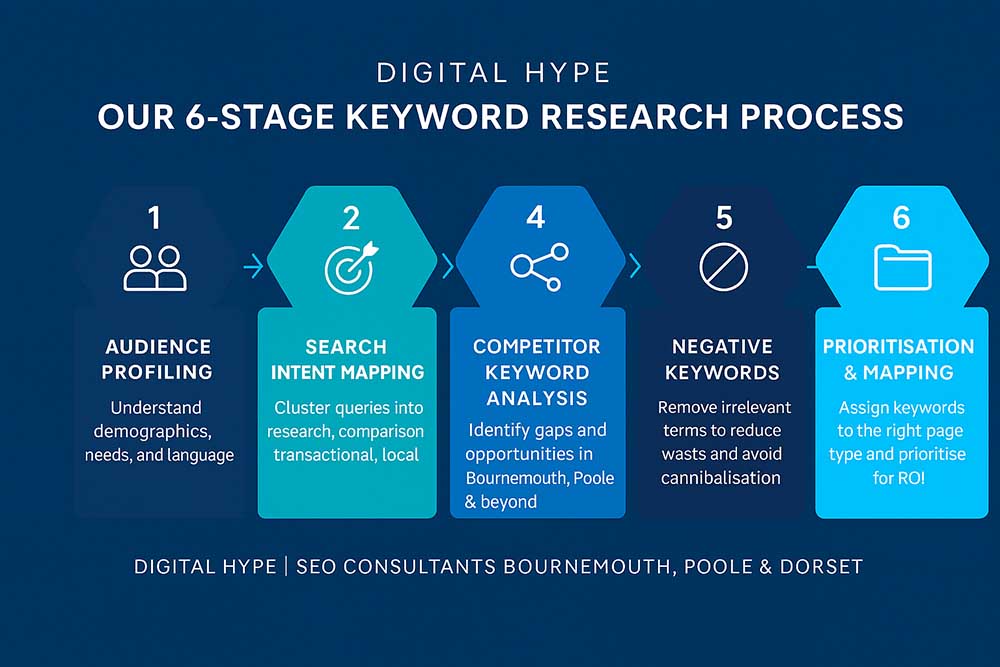
Unlock growth with smarter keyword research strategies
I’ve lost count of how many times I’ve opened a client’s analytics and seen the same pattern: rankings look good, traffic trickles in, but the conversions just aren’t there. Nine times out of ten, the issue is poor keyword targeting. The wrong search terms. The wrong intent. The wrong shape of the page.
That’s why keyword research is the backbone of every SEO campaign we run at Digital Hype. As SEO consultants working with businesses in Bournemouth, Poole, Dorset, and the UK-wide, our focus isn’t just on collecting search terms. It’s mapping what people actually want, clustering those intents, and building a strategy that makes sure your site answers them.
Why keyword research matters more than ever
In today’s competitive market, it’s not enough to rank for broad, high-volume terms. If you don’t understand search intent, your traffic won’t turn into customers. We see three common issues when clients come to us:
- Over-focus on head terms – chasing keywords like “SEO” or “plumber” that deliver volume but no relevance.
- Ignoring long-tail queries – missing out on buyers who are ready to act (e.g., “emergency boiler repair Poole”).
- Copying competitor lists blindly – without assessing whether those keywords fit your unique audience.
Keyword research done properly sets the agenda for your Content Optimisation, Competitor Analysis, and even your Conversion Optimisation.
Our keyword research process

Step 1 – Audience profiling
We start by understanding who you’re trying to reach. Are you targeting Bournemouth locals searching for “accountant near me,” or UK-wide buyers researching “best cloud accounting software”? We combine Google Analytics, social insights, and client interviews to build the picture.
Step 2 – Search intent mapping
Not all queries are equal. We group terms by intent: research, comparison, transactional, or local. This prevents wasted effort on rankings that won’t convert. Our Data-Driven Optimisation approach ensures each keyword is tied to measurable goals.
Step 3 – Competitor keyword analysis
We run deep crawls using SEMrush, Ahrefs, and SpyFu to uncover which keywords competitors dominate, and where the gaps are. Combined with our competitor analysis, this reveals opportunities that competitors are missing.
Step 4 – Semantic & entity-based keywords
Search engines now think in topics, not strings of words. We identify semantic terms and entities that help your pages build topical authority, essential for AI-driven search (GEO).
Step 5 – Negative keywords
Especially important for paid campaigns, negative keyword filtering stops wasted ad spend. For SEO, it also helps prevent cannibalisation and wasted content.
Step 6 – Prioritisation & mapping
Finally, we categorise keywords into actionable clusters. Each group is assigned to page types, categories, blog, service, local landing page, and prioritised by potential ROI.
Keyword Priority Matrix (example)
| Keyword | Intent | Difficulty | CPC | Priority | Recommended Page |
| “SEO consultants Bournemouth” | Local/service | Medium | £12.50 | High | Service page |
| “best mortgage advisor Poole” | Comparison/local | High | £8.90 | Medium | Blog/guide |
| “emergency electrician Dorset” | Transactional | Low | £6.20 | High | Local service page |
| “keyword mapping template” | Research/guide | Low | £3.10 | Medium | Blog/resource |
Service-by-budget
- Small businesses → Quick-win keyword lists for local SEO (targeting “near me” and long-tail queries).
- SMEs → Full keyword mapping with competitor analysis, semantic coverage, and search intent clusters.
- Corporates → International targeting, topical authority planning, and alignment with e-commerce SEO or multi-region campaigns.
💡 Not sure what’s right for you? Our Optimised Budget approach makes sure every pound is used effectively.
Book a free keyword research consultation
Let our SEO consultants in Bournemouth, Poole, and Dorset show you which keywords will actually move the dial for your business.
Contact Digital HypeFAQs – Keyword Research & SEO

1. What makes keyword research different with SEO consultants vs DIY?
DIY tools show volume, but consultants map intent and ROI.
Metric to watch: enquiry lift after page optimisation.
2. How often should I update my keyword research?
Quarterly at a minimum, or after major algorithm updates.
Metric to watch: ranking stability vs traffic changes.
3. Can keyword research help with local SEO in Bournemouth?
Yes. Local intent queries like “near me” or “in Poole” can transform traffic into footfall.
Metric to watch: map pack clicks.
4. Should I target short-tail or long-tail keywords?
Both, but long-tail usually drives conversions.
Metric to watch: conversion rate by keyword length.
5. What tools do you use?
SEMrush, Ahrefs, SpyFu, Google Keyword Planner, and our proprietary mapping process.
Metric to watch: keyword growth by category.
6. Can keyword research reduce ad spend waste?
Yes, via negative keyword filtering and better audience matching.
Metric to watch: cost per qualified click.
7. Do you offer international keyword research?
Yes, for corporates or exporters.
Metric to watch: visibility by region.
8. How long before results show?
Early gains within 6–8 weeks, significant shifts in 3–6 months.
Metric to watch: leads attributed to new keyword pages.
Why choose Digital Hype for keyword research?
- Local Insight – We have in-depth knowledge of Bournemouth, Poole, Dorset, and the UK-wide markets.
- Competitive edge – We don’t just gather keywords; we uncover competitor blind spots.
- Future-ready – Our keyword research aligns with GEO (Generative Engine Optimisation) for AI-driven search.
- Integrated – We link research to content optimisation, image optimisation, and wider SEO strategy.
👉 Speak to our SEO team today and unlock the keywords that actually bring leads, not vanity traffic.
